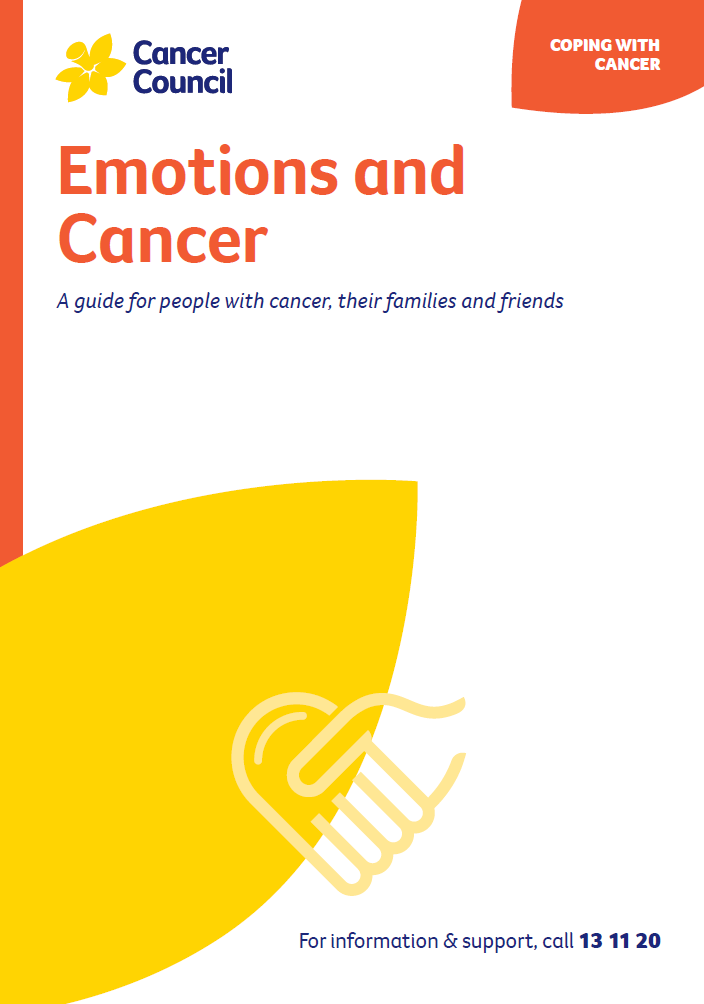- Home
- About Cancer
- Coping with a diagnosis
- Emotions and cancer
- The people in your life
- Other people’s reactions
Other people’s reactions
The reactions from your family and friends will depend on many factors, including their previous experience of cancer and their own coping styles. Sometimes people respond in ways that may make you feel hurt, angry or frustrated.
Learn more about:
Different types of reactions
The different reactions from your family and friends may include:
| Becoming very distressed | People often have a strong emotional reaction to the word “cancer”, but they may not be aware that cancer treatments and outcomes are improving all the time. |
| Saying the wrong thing | People often don’t know what to say. They may appear too positive or make light of your situation, or they may even say something tactless or ill-informed. Try not to take their initial reactions as a sign that they don’t care. They may need as much information, support and advice as you do. They might be fearful of losing you, frustrated they can’t do anything about the disease, or worried about how the illness will change their life. |
| Giving unhelpful advice | In their eagerness to help, people might offer confusing advice or want you to try new “miracle cures” that aren’t evidence-based. Let them know that you are making treatment decisions based on discussions with your medical team. Explain that every cancer is different and you need to follow the advice of experts. |
| Withdrawing from you | Some friends may seem to avoid you. They might feel like they can’t cope with what you’re going through. If you think not knowing what to say is stopping a friend visiting you, you could call them to put them at ease. You may find that talking openly about the illness and treatment helps everyone. |
Give your family and friends time to adjust to the diagnosis. After the initial shock, most people will be supportive.
In some cultures, cancer may be seen as contagious, sent to test you, caused by bad luck or always fatal. People may not want to talk about it openly and may not want to use the word “cancer”. If it is hard to talk about cancer within your community, try approaching a community leader to help you, or call Cancer Council 13 11 20 for confidential support.
How to manage misunderstandings
After a cancer diagnosis, communication becomes even more important in your relationships. If you feel hurt by the reaction of someone close to you, a conversation may help clear the air:
- Make time to talk. Don’t wait for the “right” time – it may never come.
- Be honest about what you are thinking and feeling.
- Focus on understanding each other – at least at first, this can be more important than trying to solve the problem.
- Really listen to what the other person is trying to say and try to understand where they are coming from.
People usually don’t mean to make things worse. Their reactions come from their own difficulties in handling feelings such as fear and anxiety, or from uncertainty about what to do or say.
Dani
→ READ MORE: Ways to share how you’re feeling
Podcast: Family Dynamics and Cancer
Listen to more episodes from our podcast for people affected by cancer
More resources
Dr Michael Murphy, Psychiatrist, NSW Health, and Conjoint Senior Lecturer, UNSW, NSW (clinical review); A/Prof Anne Burke, Co-Director, Psychology and Allied Health Lead, Cancer, Central Adelaide Local Health Network and The University of Adelaide, SA; Hannah Chen, Psychologist, Cancer Council Queensland; Hazel Everett, Clinical Nurse Consultant, Cancer Services, St John of God Subiaco Hospital, WA; Shona Gates, Senior Social Worker, North West Cancer Centre, TAS; Dr Jemma Gilchrist, Senior Clinical Psychologist, Mind My Health and Crown Princess Mary Cancer Centre, Westmead, NSW; Sandra Hodge, Consumer; Dr Michael Murphy (see above); Caitriona Nienaber, 13 11 20 Consultant, Cancer Council WA; Dr Alesha Thai, Medical Oncologist, Peter MacCallum Cancer Centre, VIC; Alan White, Consumer.
View the Cancer Council NSW editorial policy.
View all publications or call 13 11 20 for free printed copies.

